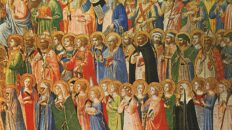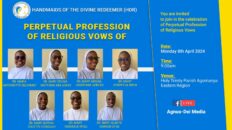
THEME: FILLED WITH THE HOLY SPIRIT [Part I]
READINGS: Acts 7:55-60/ Rev. 22:12-14, 16-17, 20/ John 17:20-26
7th Sunday of Easter
Last Thursday was the feast of our Lord’s Ascension. On the day of his Ascension, our Lord asked his disciples to remain in Jerusalem for the reception of the Holy Spirit. They waited in prayer and on the tenth day, the Day of Pentecost, they received the powerful outpouring of the Holy Spirit. So we are also in a period of prayerful waiting between last Thursday and next Sunday, the feast of Pentecost. In this period the messages focus on the Holy Spirit.
Looking through the readings of today, I find a message about the Holy Spirit in the very first verse of the first reading. It describes Stephen as ‘filled with the Holy Spirit’ (Acts 7:55). So for today and next Sunday, we shall consider what it means to be ‘filled with the Holy Spirit’, or to be ‘full of the Holy Spirit’.
St. Luke is the author of the Acts of the Apostles, so we intend to look at what he means by being ‘filled with the Holy Spirit’ in both his Gospel and the Acts of the Apostles.
In Luke’s Gospel, the expression ‘filled with the Holy Spirit’ is used at least thrice and in the Acts of the Apostles, at least nine times.
LUKE’S GOSPEL
- 1. In Luke 1:41-44, Elizabeth, ‘filled with the Holy Spirit’, exclaimed before her visiting young cousin, Mary: ‘Why is it that the Mother of my Lord should come to me?’ Thus, the Holy Spirit enabled Elizabeth to have a revelation: that her young cousin, whose pregnancy she had no previous knowledge of, was carrying the Son of God in her womb.
- 2. Secondly, Zechariah was ‘filled with the Holy Spirit’ to praise God and prophesy after his tongue was loosened at the naming of his son (Luke 1:67-79).
- Thirdly, St. Luke says, Jesus was ‘filled with the Holy Spirit’ after his baptism; and he was then led by the Spirit to the desert (Luke 4:1). Thus, anointed with the Holy Spirit Jesus had victory over Satan in his temptations, and he faithfully and successfully accomplished his mission.
ACTS OF THE APOSTLES
- Acts 2:4 = On the day of Pentecost, the apostles and other disciples were all filled with the Holy Spirit who enabled them to speak in foreign tongues and to proclaim boldly.
- Acts 4:8 = Peter, filled with the Holy Spirit, courageously addressed the Sanhedrin, the very ‘Supreme Court’ which tried Jesus. It is also amazing how an illiterate fisherman confounded the ‘Supreme Court’ with divine knowledge and wisdom (cf. Luke 12: 11-12).
- Acts 4:31 = when the believers had prayed, they were filled with the Holy Spirit who enabled them to continue to proclaim the Word with boldness.
- Acts 9:17 = Ananias told the blind Saul that he was to regain his sight and be filled with the Holy Spirit so as to be the witness of Jesus in many towns and nations.
- Acts 13:8-9 = St. Paul, filled with the Holy Spirit, prevailed over the magician, Elymas (at Paphos).
- Acts 13:52 = the disciples (including St. Paul) were filled with the Holy Spirit to withstand a persecution in Antioch in Pisidia.
ST. STEPHEN (We single out St. Stephen because of a special mention of him in today’s first reading):
- Acts 6:3 = the criteria for choosing Stephen and six others to serve as deacons were ‘respected men, full of the Holy Spirit and wisdom.’
- Acts 6:5-10 = Stephen is singled out as a man ‘full of faith and Holy Spirit’. Thus, filled with the Holy Spirit, who gave him grace, power, the gifts of miracles and wisdom, St. Stephen easily defeated the men from the Synagogue of Freedom who engaged him in arguments.
- Acts 7:55-60 = ‘Stephen, filled with the Holy Spirit, gazed into heaven and saw the glory of God and Jesus sitting at God’s right hand.’ Thus, the Holy Spirit graced St. Stephen with ‘beatific’ vision and personal holiness.
Part I – Conclusion
Beloved, as we look forward to considering what it means to be personally filled with the Holy Spirit, we pray that we shall so prepare ourselves (by prayers, meditation on the Word, confession of sins) such that on the feast of Pentecost we shall experience a gentle yet a greater stirring of the Holy Spirit in our hearts and minds. Amen!
TO BE FILLED WITH THE HOLY SPIRIT:
From the Gospel of Luke and the Acts of the Apostles, we learn that when we are filled with the Holy Spirit, he may enable us to:
- Receive divine knowledge or revelation like St. Elizabeth;
- Praise God like Zechariah;
- Prophesy like Zechariah;
- Have victory over evil like Jesus Christ;
- Faithfully and successfully execute our mission like Jesus;
- Speak in foreign tongues like the apostles and disciples;
- Proclaim boldly like the disciples;
- Defend our faith with courage and wisdom like St. Peter and the others;
- Be a true witness of Christ like St. Paul;
- Endure persecution like St. Paul and the disciples;
- Render faithful service to the Church like the first seven deacons;
- Receive grace, faith and other gifts like St. Stephen; and
- Be holy and have an ecstatic experience like St. Stephen.
In short, then, to be filled with the Spirit is to exhibit some of the gifts and fruit of the Spirit. Generally, one person cannot have all the gifts, but he/she is expected to bear all aspects of the fruit of the Spirit mentioned by St. Paul in Gal. 5:22-23.
HOW TO BE FILLED WITH THE SPIRIT
As a vehicle cannot run without fuel, so the Christian cannot operate without the Holy Spirit. He is the fuel for our Spiritual Life. We receive our initial fueling by the Holy Spirit at Baptism; and we have a special re-fueling at Confirmation. But as a vehicle has to be fueled regularly, so the Christian needs the constant re-filling by the Holy Spirit. The fueling or re-fueling is a free gift from the Spirit of God, but we need to clean our spiritual ‘fuel tanks’ and we need to have a spiritual ‘fuel dispenser’ (or hose) in place. We clean our ‘fuel tanks’ through repentance and Confession; and the following make up our ‘fuel dispenser’: the sacraments, prayer, fasting, works of charity, worship, devotion, reading and mediating on the Word of God, good moral life, etc….
CONCLUSION
Beloved, let us renew our commitment to clean our spiritual ‘fuel tanks’ and to keep our spiritual ‘fuel dispenser’ running. With this, may we enjoy the abundant re-fueling by the Holy Spirit this Pentecost and beyond, amen!
By Very Rev. Fr. John Louis








